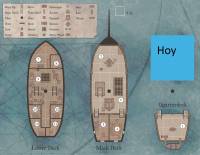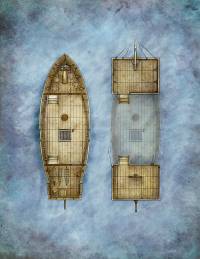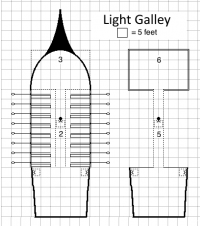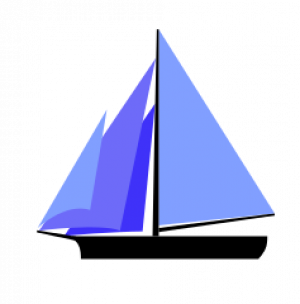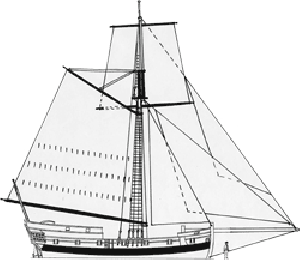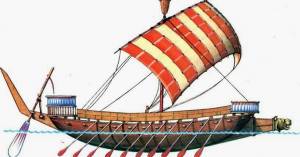Table of Contents
Ships and Boats
Overview
When a crew is being defined a 'Sailor' is a person who has put at least one skill point into Profession: Sailor or at least two points into Profession:Fisherman. Any character without either of those skills counts as an Unskilled Labourer. If a seamanship roll is required use the highest Profession:Sailor modifier in the crew - if it falls to a fisherman, they may use half of the Profession:Fisherman modifier. A Master Seaman will have a Profession:Sailor total modifier of 10 or more.
Speed
Speed are shown in Miles per Hour. Rowed speeds are an average, crews might be able to go faster for a short distance. Sailing speeds are for a Favourable, but Light, Wind - stronger winds mean faster journeys, unfavourable winds mean slower journeys. In the worst case scenario, a ship might not be able to move at all. A rowed ship can travel for 10 hours a day. A sailed ship for 24 hours a day (assuming they have the proper crew)
If you are on a river, you might want to add 2 miles an hour for down stream travel, but then remember to subtract it for upstream travel.
Personally, I tend to use the given values - unless I have a reason not to.
No Boatyard
There are a few very simple vessels that can be built without access to specialized tools and facilities. There is still a small cost to cover ropes, labour an similar expenses.
Basic Boatyard
A basic boatyard can build vessels, up to 30feet in length, using a variety of construction techniques. Some are flat bottomed vessels that are normally rowed or paddled and are at their best when used in quiet waters such as lakes, harbours and slow rivers. Other, with the addition of dagger-boards or lee-boards, can be fitted with a sail.
| Row Boat Variants | |
|---|---|
| Punt-Skiff 40gp: 15ft x 5ft. A punt-skiff is a flat-bottomed boat that is intended for use in still or shallow water. It does not come with a sail. It is often used by lone fishermen or marsh dwellers. These vessels are particularly effective on sluggish or shallow rivers and wetlands, and are often poled or paddled, rather than rowed. DC 10, Crew:1, Passengers:3, Speed Rowed:1.5 mph | 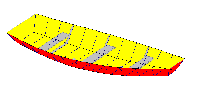 |
| Row Boat 45gp: Standard rowing boat, 15ft x 5ft, used as a tender and as a small boat for local work. It does not come with a sail but you can upgrade a Row Boat by fitting a mast and simple sail for 5gp. However, they don't sail particularly well. They are best in quiet waters such as small rivers, harbours or very near the coast. DC 10, Crew:1, Passengers:3, Speed Rowed: 1.5mph, (Speed Sailed:1.5mph) | 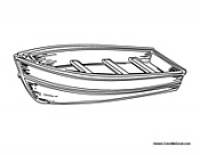 |
| Dinghy 50gp: Looking very much like a rowing boat, 15ft x 5ft, a dinghy is designed for sailing and copes better with rough water better. It is fitted with a mast and lugsail sail at purchase. Dinghy's can deal with most waters but should not be taken too far from shore. DC 15, Crew:1, Passengers:3, Speed Rowed: 1mph, Speed Sailed:2mph | 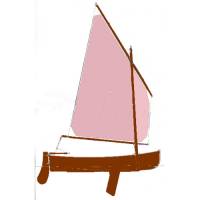 |
| Ship's Boat variants | |
| Swamp Boat 500gp: Sometimes known as a Great Punt, is 20 ft x 10 ft with a very shallow draught, a Great Punt is little more than an extra large punt-skiff, and cannot be fitted with a sail. It needs a minimum crew of three paddlers/polers, but will go faster with a larger crew. They are often uses as work boats in marshes, swamps and bayous. These vessels are particularly effective on shallow rivers, lakes and wetlands. They do not have a cabin and are rarely used for long trips or at night. DC 10, Crew:7, Passengers:8, Speed Rowed: 3mph | 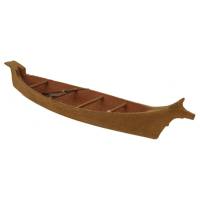 |
| Fishing Boat 500gp: 20ft x 8 ft. Open boats that are fitted with a simple square sail. Used by fishermen and local traders, this versatile vessel requires a three-man crew (One sailor and two labourers). Fishing boats work well on rivers, lakes and close coastal waters. They do not have a cabin and are rarely used for long trips or at night. DC 15, Crew:3, Passengers:12, Speed Rowed: 0.5mph, Speed Sailed:2mph | 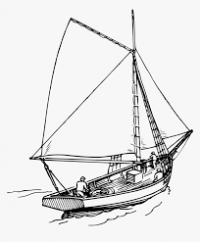 |
| Launch 500gp: 20ft x 8 ft. A large clinker built boat with two banks of oars . Often used for water based patrols or to ferry important people around. Every extra pair of oars you add (and reduce the passenger capacity) the launch moves 5 faster. Special racing crews can go even faster. It has a short mast and square sail which give a sailing speed of 10. They do not have a cabin and are rarely used for long trips or at night. DC 15, Crew:9, Passengers:5, Speed Rowed: 3mph, Speed Sailed:1mph The Local Patrol Boat is a launch with a military crew. When all the spots are filled by marines, The Local Patrol Boat can achievespeeds of Rowed: 5mph, Sailed:1mph. | 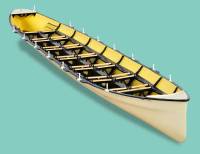 |
| Other Vessels | |
| Shallop (Riverboat) 2000gp: 30ftx12ft with a single mast, lee boards, a simple sail and oars. The Riverboat is a large fishing boat with a small cabin, but is mainly used to transport cargo, on rivers, lakes and estuaries. It is commonly known as a Hog as it is said to wallow like a hog when faced with inclement weather. It is slow and has a single low hold, so it doesn't generally take passengers. Note: DC 15, Crew:4, Speed Rowed: 0.5mph Speed Sailed:2mph The Area Patrol Boat is a Riverboat (Shallop) that has a lateen sail and lee boards, for a sailing speed of 3mph. It is crewed by marines. | 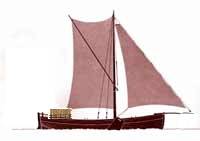 |
| Pinnace 2000gp: 30ft x 8 ft. It can house two people in comfort, four people living in close contact and up to ten at a real push. The Pinnace works well in wide rivers, lakes, estuaries and coastal waters. DC 15, Crew:2, Passengers:1, Speed Rowed: 0.5mph, Speed Sailed:3mph | 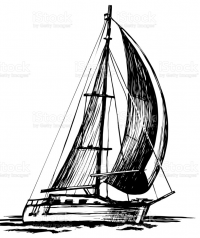 |
Large Boatyard
A large boatyard can build vessels, up to 60 feet in length, using a variety of construction techniques. Some are flat bottomed vessels that are normally rowed or paddled but some are designed to be sailed.
| Flatboat 500gp: 40ftx15ft. Poor build quality and the most basic materials make this the most fragile of vessels - think very large raft. It cannot sail and can only move at a speed of 10 under poles or sweeps. It is OK for gentle local work, floats down rivers easily, but is difficult to row upstream. However, if you wish to move cargo around a quiet lake or down a gentle river, this is probably your best bet. DC10, Crew:6, Speed Rowed: 1mph | 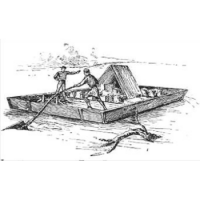 |
| Keeler 3000gp: 45ftx15ft - Built shallow and narrow (with lee boards), a keeler carries a square sail, has a cabin set midship and open holds at each end. The single cabin is about ten feet wide and fifteen feet long and is fitted with benches along each side This vessel has a shallow draught and is well suited to carrying passengers and cargo along canals, rivers, and lakes, although it can cope with estuaries if it has to. The keeler is the workhorse of the Sellen. DC20, Crew:8, Speed Rowed: 1.5mph, Speed Sailed:2mph | 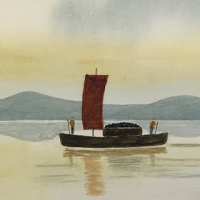 |
| River Wherry (Gundalow) 3500gp: 55ftx20ft - Built shallow with a gaff rigged sail a cabin aft with a long hold in front of it, this vessel is designed for trading along rivers. The cabin is roughly 15×15 and fitted with bunks to sleep up to 8 people, it is cramped when the vessel is at full capacity, but at least each of the bunks has a privacy curtain. It has a shallow draught and can handle fast flowing waters as well as more sedate flows. It is one of the fastest vessels on rivers and lakes, but doesn't cope with estuaries or open water very well. Often favoured for fast delivery of small and valuable items DC20, Crew:6, Speed Rowed: 0.5mph, Speed Sailed:2.5mph | 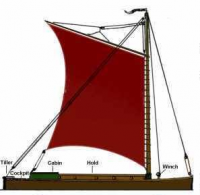 |
| Sailing Barge (Scow) 4000gp: 55ft by 25ft. With main and mizzen masts , she has lee boards and a shallow draft. The Sailing Barge is designed for trading along rivers, lakes and estuary systems - and can deal with inshore waters quite well. However, sailing barges are not good in open water. When the lee-boards are down she can handle a lot of sail, and when they are up she can be pulled over a sandbar or beach for the night. She has a shallow cargo hold, a low cabin and can take quite a bit of deck cargo as well. The cabin has bunks for four passengers, but she can accommodate another four who are prepared to sleep in a sitting position (or on the floor). Primarily a cargo vessel, she is queen of the Sellen. DC20, Crew:6, Speed Rowed: 0.5mph, Speed Sailed:2mph | 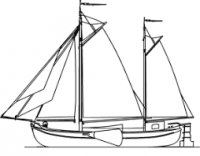 |
| Lugger 4500gp: 60ft by 25ft with a deep build. She has two masts (Main and Mizzen) both rigged with lug sails, the Lugger is mainly used as a coastal trader and fishing ship. The Lugger generally has a cabin for the crew, but most of the vessel is deck and hold for the cargo/catch. The Lugger is particularly well suited to lakes, estuaries and coastal waters, but she can cope with the open sea if required. They aren't very good on rivers or waterways that are narrow or shallow. DC20, Crew:6, Speed Rowed: 0.5mph, Speed Sailed:2mph | 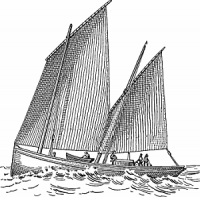 |
Great Boatyard
A great boatyard builds large vessels that aren't suitable for river use or, in some cases, aren't good for long distance travel. All of these ships can be sailed on lakes, sea' oceans - or any other body of open water. Unless they can be rowed, they cannot be used on rivers.
Commercial Ship Yard
This yard makes sailing vessels that merchants and shipping companies use for trade. They can, however, be armed or used as troop transports - so many National Navies, buy these vessels and arm them, particularly for carrying important people and fighting longer distance wars. Some merchants use armed vessels on 'difficult' trade routes - although these are often only lightly armed, when compared to military use. Most merchant crews are made up of (about) 50% commoners (basic Sailors), 25% Warriors (Topsmen/defence) and 25% experts (Captain, Navigator, Senior Sailors in skilled roles)
Naval Ship Yard
This yard makes galleys for the navies of the Hann Empire. They aren't good for trade as their cargo capacity is limited, and their running costs are high, because of their large crews. Nor do they work well on the high seas, and are generally only used in shallow and coastal waters. Galleys in The Hann Empire are generally rowed by free people, although a few financial convicts may be required to work their debts off by serving in a galley. A normal galley might have a crew of 50% warriors (Soldier/Sailors), 25% Commoners (basic Sailors), and the rest as Experts. Both the commoners and Experts will have some militasry training.
Others
These vessels are not, generally, available in The Stolen lands or the Hann Empire or Stolen Lands game.



